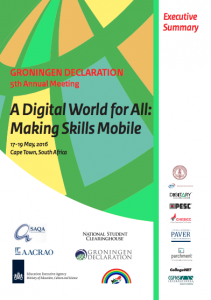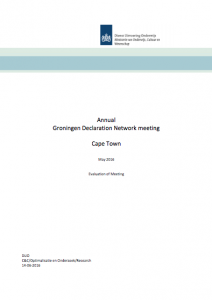Spreading the News The Groningen Declaration is coming into its own. Only a year ago, word had not yet spread far beyond Network members and their colleagues; now, there is a European Union project proposal to revise the Diploma Supplement throughout the European Higher Education Area, and a critical element is digitalisation, with direct reference to the work of the Groningen Declaration Network. Many in the higher education field have come to understand the need for reliable and secure digitalisation of student data, and the groundwork already laid out by the GDN will be instrumental to the work ahead. Clear Ideals At the fifth annual meeting of the GDN, hosted by the South African Qualifications Authority (SAQA) on 17 to 19 May 2016, participants agreed that the tools for digitalisation are at hand and need only to be put to use: We already have the technology; we just need the cooperation and communication to make use of it. Once again, the commitment and enthusiasm of the people working at the technical level to improve student mobility and qualifications transparency were openly apparent among the meeting’s participants. And once again, as a person privileged to attend the event, I was persuaded that the noble goals and sincere intentions of the technicians and experts working in student data are the defining characteristics of this Network. As disillusionment in the Bologna Process persists — as long as the goals of harmonisation and transparency are revealed in practice to be aspirational targets at best and, at worst, superficial rebranding — we can acknowledge that higher education reforms are very slow to take hold when they are handed down as decisions from the Ministry. More than fifteen years after the 29 signatures garnered in 1999, experience tells us that, while objectives may be identified as top-down mandates, international networks of experts and technicians are needed to start and steer the work of making mobility a working reality. This is what the founders of the GDN have done, and what each new member of the Network takes forward upon signing the Groningen Declaration. Local and Global Mandates For the fifth annual GDN meeting, SAQA had large shoes to fill, following the success of last year’s meeting in Málaga. Happily for the participants, the venue and programme in Cape Town left little to be desired. From the location near the V&A Waterfront to the warm hospitality and beautiful surroundings, the work programme was framed so participants could meet and connect with each other amidst examples of local history and entrepreneurialism. The courtesy and dignity of our hosts emphasised the human dimension of our work in higher education, so often obscured by bureaucratic language and political correctness. Yet, always, the human dimension — the struggle of each person to gain skills and acquire recognition of his or her qualifications — is closely tethered with broad political goals. At this meeting, representatives from UNESCO confirmed the importance and centrality of the GDN to the establishment and success of the planned Global Convention on recognition of academic qualifications. This new UNESCO Convention will share a key common objective with the GDN: facilitating student mobility. Based on the six existing regional Conventions on recognition, the Global Convention will take into consideration that recognition in higher education is a craft and a system unto itself. The most successful regional Convention — the Lisbon Convention — offers examples of good practice, namely national centres for recognition practice and deliberate capacity building among recognition experts. The Global Convention is intended as a framework for handling the massification of higher education and ever-increasing mobility of students and graduates, but it can only be successful if the daily and technical work of recognition is conducted by people with the knowledge and skills to do it well. Real Challenges As a tool to enable mobility, digital student data has to be handled with great care. While the technology is readily available, the key factors are security and trustworthiness. Good practices in security might be found at various organisations, including the United States’ National Student Clearinghouse, and in established practices. Trustworthiness of data goes back to the legitimacy of the institution granting the degree or academic credits and the authenticity of the document presented for recognition (Is the diploma real and based on actual academic work by the person named therein?). Recognition experts have techniques to determine the trustworthiness of documents; the task ahead is to support recognition experts (recognition authorities) in accepting digital data sets, in lieu of paper documents, as the original source with which to process incoming applications. With the massification of higher education and the increased value of higher education diplomas, it is more important than ever for degrees to be verified and officially recognised. The more demand there is for valuable diplomas, the more lucrative it becomes to cheat the system. As knowledge societies that rely on the veracity of higher education diplomas for our institutions and systems to function properly, we cannot afford to let corruption tarnish the qualifications people with real skills are bringing to their jobs. Meanwhile, using a paper-based system is unrealistic given the number of people and the amount of data to be assessed and reviewed. Digitalisation is inevitable, so we had better make sure the systems we develop for student data are as secure and reliable as possible. Growing the Network The Groningen Declaration Network started out very modestly, with just eleven signatories in 2012. With the newest 12 signatories in Cape Town this May, the Network now boasts 53 signatory organisations. The work of the GDN has been coordinated by Herman de Leeuw – originator of the Declaration, one of the founders of the Network, and Executive Secretary of the GDN. While the Network has grown steadily and solid work has been done thus far, discussions at the fifth annual meeting included, necessarily, the framework for the GDN going forward, including the establishment of the Network as a non-profit entity. It certainly seems, based on the progression and work to date, that establishing a legal structure and programme of work around the GDN could only further contribute to its goal of establishing a global area of convergence on digital student data depositories to make free movement of students and skilled workers a reality. GDN events and meetings are still rather exclusive — by invitation only — but participation is expanding. At the meeting in Cape Town, about half of the nearly 100 participants were newcomers to the Network. The intention is still to expand as widely as possible while remaining functional, task-oriented and results-driven. The Network is attentive and responsive to inquiries for information and requests to participate in future events. For information, visit the GDN website. Related article: Malaga: Personal Impressions of the 4th Annual GDN Meeting. | 


 Personal Impressions, by Anna Glass
Personal Impressions, by Anna Glass Post-Event Feedback from Cape Town
Post-Event Feedback from Cape Town